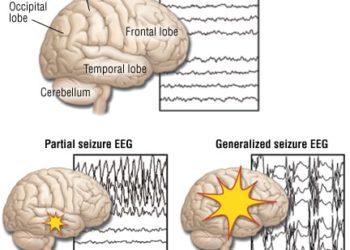Cannabidiol plus conventional antiepileptics reduces drop seizure frequency in the Lennox-Gastaut syndrome
1. Amongst adults and children with the Lennox-Gastaut (LG) syndrome, addition of cannabidiol to a conventional antiepileptic regimen reduced drop seizure frequency compared to placebo treated patients.
2. The most common adverse events amongst patients treated with cannabidiol were diarrhea, somnolence, and decreased appetite. These effects were dose-dependent.
Evidence Rating Level: 1 (Excellent)
Study Rundown: The LG syndrome is a developmental form of epilepsy. The syndrome is partly characterized by drop seizures, which can result in serious injury and significantly reduce patient quality of life. Cannabidiol has been shown to reduce the frequency of seizures in other settings, but its role in the treatment of LG syndrome remains unclear. Investigators sought to determine whether treatment with cannabidiol would significantly reduce rates of the primary outcome, the in frequency of drop seizures compared to baseline. In this multicenter randomized controlled trial, cannabidiol was found to significantly reduce the frequency of the primary outcome at fourteen weeks.
Strengths of this study include its randomized, multicenter study design, and recruitment of more patients than originally planned. Weaknesses include the use of percent change scores as the primary outcome and short follow-up time.
Click to read the study, published in NEJM
Relevant Reading: Trial of Cannabidiol for Drug-Resistant Seizures in the Dravet Syndrome
In-Depth [randomized controlled trial]: This was a phase III, multicenter, randomized controlled trial. The study population comprised patients aged 2-55 years with the LG syndrome, electroencephalogram findings characteristic of the disease, a history of drop seizures, and treatment with one to four antiepileptics (n=225). Nonpharmacological interventions were permitted so long as they were stable before and during the trial. Key exclusion criteria included use of cannabis in the previous three months or a history of substance or alcohol use. The interventions in the trial included either 20mg/kg/day (n=76) or 10mg/kg/day (n=73) of cannabidol, and placebo (n=76). The primary outcome consisted of the percent change in drop seizure frequency from baseline after a fourteen-week treatment period. Key secondary outcomes included comparison of the percentage of patients whose seizure frequency was cut in half, change in frequency of all seizure types, and a scale reflecting the caregiver’s impression of change.
Cannabidiol at both 20mg/kg/day and 10mg/kg/day dosing was superior to placebo (Difference in percent change20 vs. placebo=21.6%; 95% confidence interval [CI], 6.7 to 34.8; P=0.005; Difference in percent change10 vs. placebo=19.2%, 95% CI, 7.7 to 31.2, p = 0.002). All the aforementioned secondary outcomes were significantly improved in both treatment arms relative to placebo. Eighty-nine percent of adverse events were judged to be mild-moderate in severity, and were most commonly somnolence, decreased appetite, and diarrhea. The most common adverse event precipitating withdrawal from the trial was elevation in aminotransferases.
Image: PD
©2018 2 Minute Medicine, Inc. All rights reserved. No works may be reproduced without expressed written consent from 2 Minute Medicine, Inc. Inquire about licensing here. No article should be construed as medical advice and is not intended as such by the authors or by 2 Minute Medicine, Inc.









